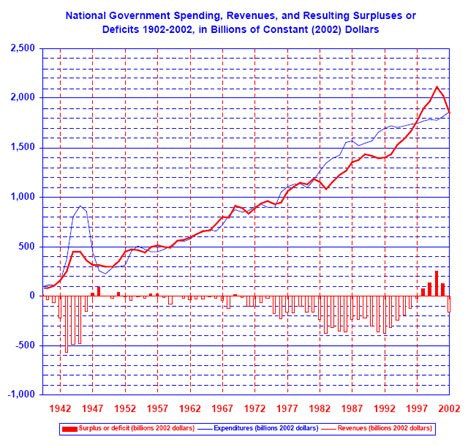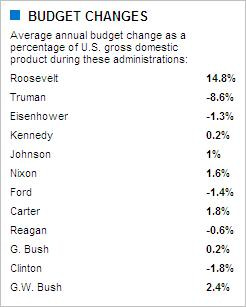Krauthammer Revives Reagan Small Government Myth
Long before he became what Politico deemed "Barack Obama's biggest critic," Washington Post columnist Charles Krauthammer was a Democrat. Dr. Krauthammer left his psychiatric practice to work for Jimmy Carter and write speeches for Walter Mondale. But that was before he fell - hard - for Ronald Reagan. And now in his latest assault on President Obama, Krauthammer is deploying a Reagan who never was to defend the mythical small government he never created.
In his Friday column, Krauthammer warns Republicans, "Don't underestimate Barack Obama." He frets that "the net effect of 18 months of Obamaism will be to undo much of Reaganism." Because of "the creation of ruinous deficits as far as the eye can see" which "are not easily reversed," Krauthammer worries that taxes (now at their lowest level since 1950) may have to be increased:
There just isn't enough to cut elsewhere to prevent national insolvency. That will require massive tax increases -- most likely a European-style value-added tax. Just as President Ronald Reagan cut taxes to starve the federal government and prevent massive growth in spending, Obama's wild spending -- and quarantining health-care costs from providing possible relief -- will necessitate huge tax increases.
Sadly, Charles Krauthammer must be confusing Ronald Reagan with someone else. Not only did the size of the federal government continue to grow under the Gipper, but the national debt tripled during the fiscal nightmare that was the Reagan presidency. Reagan was, as Timothy Noah wrote in Slate in 2004, "the man who taught Republicans to be irresponsible."
In 2001, Michael Kinsley marked Reagan's 90th birthday by noting, among other things, that when it came to small government, "this legendary Reagan revolution barely happened."
Federal government spending was a quarter higher in real terms when Reagan left office than when he entered. As a share of GDP, the federal government shrank from 22.2 percent to 21.2 percent--a whopping one percentage point. The federal civilian work force increased from 2.8 million to 3 million. (Yes, it increased even if you exclude Defense Department civilians. And, no, assuming a year or two of lag time for a president's policies to take effect doesn't materially change any of these results.)
As USA Today explained four years ago, measured as a percentage of gross domestic product, average annual federal spending dropped far more under Bill Clinton (-1.8%) than Ronald Reagan (-0.3%). As Kinsley put it:
Under eight years of Big Government Bill Clinton, to choose another president at random, the federal civilian work force went down from 2.9 million to 2.68 million. Federal spending grew by 11 percent in real terms--less than half as much as under Reagan. As a share of GDP, federal spending shrank from 21.5 percent to 18.3 percent--more than double Reagan's reduction, ending up with a federal government share of the economy about a tenth smaller than Reagan left behind.
What Reagan did leave behind was red ink as far as the eye could see. And it was the legendary Gipper whose financial recklessness and tax-cutting fetish came to define the modern GOP.
The numbers tell the story. As predicted, Reagan's massive $749 billion supply-side tax cuts in 1981 quickly produced even more massive annual budget deficits. Combined with his rapid increase in defense spending, Reagan delivered not the balanced budgets he promised, but record-settings deficits. Even his OMB alchemist David Stockman could not obscure the disaster with his famous "rosy scenarios."
Forced to raise taxes twice to avert financial catastrophe (a fact conveniently forgotten in Krauthammer's and other conservative hagiographies of Reagan), the Gipper nonetheless presided over mushrooming of the American national debt. By the time he left office in 1989, Ronald Reagan more than equaled the entire debt burden produced by the previous 200 years of American history.
To help perpetuate the myth of Republican fiscal discipline, GOP leaders including Mitch McConnell, Jon Kyl, John Boehner, Judd Gregg, Tom Coburn, John McCain and Kay Bailey Hutchison (just to name) are continuing another. As they have ever since Reagan first drank the Laffer Curve Kool-Ade, Republicans still wrongly insist that cutting taxes increases government revenue and thereby reduces the deficit. On the same day that Charles Krauthammer again laid rose pedals at Reagan's feet, Paul Krugman explained what happens when Republicans "redo that voodoo":
It's not true, of course. Ronald Reagan said that his tax cuts would reduce deficits, then presided over a near-tripling of federal debt. When Bill Clinton raised taxes on top incomes, conservatives predicted economic disaster; what actually followed was an economic boom and a remarkable swing from budget deficit to surplus. Then the Bush tax cuts came along, helping turn that surplus into a persistent deficit, even before the crash.
But we're talking about voodoo economics here, so perhaps it's not surprising that belief in the magical powers of tax cuts is a zombie doctrine: no matter how many times you kill it with facts, it just keeps coming back. And despite repeated failure in practice, it is, more than ever, the official view of the G.O.P.
For his part, Charles Krauthammer isn't merely parroting that "'zombie doctrine" which never worked; he's worshipping a Ronald Reagan who never was.



